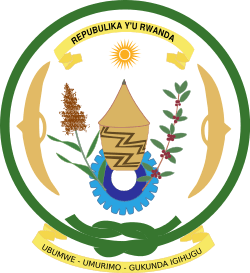Rwandan parliamentary election, 2008
| | |||||||||||||||||||||||||||||||
| |||||||||||||||||||||||||||||||
| |||||||||||||||||||||||||||||||
 |
| This article is part of a series on the politics and government of Rwanda |
|
Government |
|
Judiciary |
|
United Nations in Rwanda |
Parliamentary elections were held in Rwanda from 15 to 18 September 2008. The elections were boycotted by the opposition,[1] and resulted in a victory for the ruling Rwandan Patriotic Front (FPR), which won 42 of the 53 elected seats. The elections also produced the world's first national parliament with a female majority.[2]
Electoral system
The 80 members of the Chamber of Deputies consisted of 53 directly-elected members elected by proportional representation in a single nationwide constituency, 24 women elected by electoral colleges, and three members elected by mini-committees, two of which represented youth and one represented disabled people.
Campaign
Campaigning for the elections began on 25 August 2008. The day was marked by a march of about 2,000 FPR supporters through Kigali.[3]
The FPR assembled a coalition which included six smaller parties: the Ideal Democratic Party (PDI), the Centrist Democratic Party (PDC), the Party for Progress and Concord (PPC), the Prosperity and Solidarity Party (PSP), the Democratic Union of the Rwandan People (UPDR) and the Rwandan Socialist Party (PSR).[4] Aside from the FPR coalition, only two other parties participated in the elections; the Social Democratic Party and the Liberal Party. Since both also supported President Paul Kagame, there was no opposition participation, as they remained in exile.[1] In addition to the political parties, a single independent candidate, J.M.V. Harelimana, stood in the elections.[1][5]
The United Democratic Forces opposition coalition, based in Belgium, said that the FPR had total control of the state machinery and electoral process, making the election a mere "smoke screen".[1]
Conduct
The EU sent an observation mission,[6][5] as did the Commonwealth of Nations, the African Union, COMESA, and the East African Legislative Assembly.[5]
The direct phase of voting for 53 seats occurred on 15 September. Voting was from 6 am to 3 pm. Kagame voted in the Nyarugenge district of Kigali, and he said on this occasion that the people and the parties needed "to work together for national development".[1] The indirect phase of voting for 27 seats began on 16 September and ended on 18 September..[7][1]
Results
Chrysologue Karangwa, the head of the electoral commission, announced on 16 September that the FPR had won 42 seats, the Social Democratic Party won seven, and the Liberal Party won four.[7]
| Party | Votes | % | Seats | +/– | ||
|---|---|---|---|---|---|---|
| Rwandan Patriotic Front coalition | Rwandan Patriotic Front | 3,655,956 | 78.76 | 36 | +3 | |
| Centrist Democratic Party | 1 | –2 | ||||
| Democratic Union of the Rwandan People | 1 | 0 | ||||
| Ideal Democratic Party | 1 | –1 | ||||
| Party for Progress and Concord | 1 | +1 | ||||
| Prosperity and Solidarity Party | 1 | New | ||||
| Rwandan Socialist Party | 1 | 0 | ||||
| Social Democratic Party | 609,327 | 13.12 | 7 | 0 | ||
| Liberal Party | 348,186 | 7.50 | 4 | –2 | ||
| Independent | 27,848 | 0.60 | 0 | 0 | ||
| Reserved seats | – | – | 27 | 0 | ||
| Invalid/blank votes | 56,372 | – | – | – | ||
| Total | 4,697,689 | 100 | 80 | 0 | ||
| Registered voters/turnout | 4,752,540 | 98.85 | – | – | ||
| Source: NEC, African Elections Database | ||||||
Aftermath
The newly elected deputies were sworn in on 6 October, and Rose Mukantabana was elected as President of the Chamber of Deputies, receiving 70 votes and defeating Abbas Mukama. Dennis Polisi was re-elected as First Vice-President of the Chamber of Deputies, and Jean Damascene Ntawukuriryayo was elected as its Second Vice-President.[8]
References
- 1 2 3 4 5 6 "Rwanda votes in election without opposition", AFP, 15 September 2008.
- ↑ Around the World Network, July, August, September 2008
- ↑ "Rwandan election campaign underway with ruling party march", AFP, 25 August 2008.
- ↑ "Ruling FPR assembles wide coalition", Angus Reid Global Monitor.
- 1 2 3 "Over 1000 deployed to observe Rwandan parliamentary polls", African Press Agency, 15 September 2008.
- ↑ "European Union deploys Election Observation Mission to Rwanda", European Union press release, IP/08/1231, 1 August 2008.
- 1 2 "Kagame's party scoops majority of seats", Sapa-AFP (IOL), September 16, 2008.
- ↑ Felly Kimenyi, "Parliament Gets Female Speaker", The New Times (allAfrica.com), 7 October 2008.